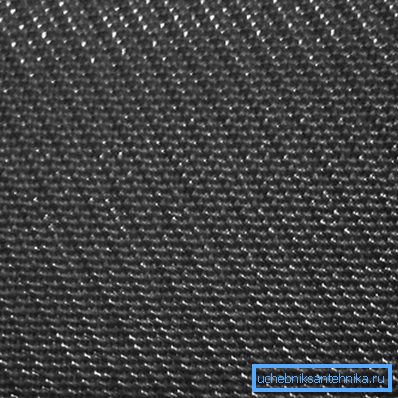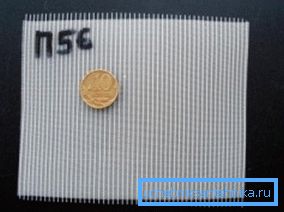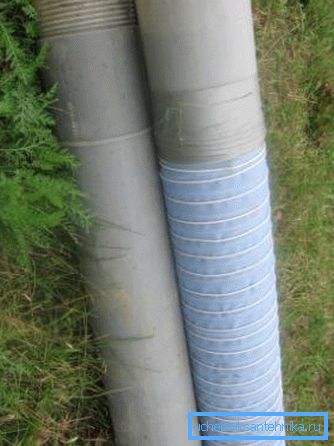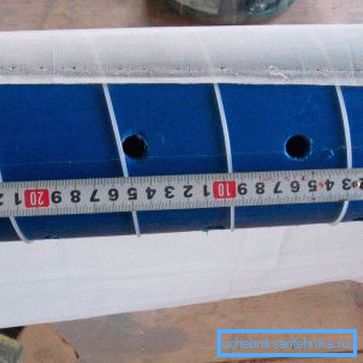Filter mesh for wells - the features of this site
As is known, in artesian wells, which are included in the limestone layers, water purification from coarse impurities is not required. But if we are talking about a well on the sand, then we cannot do without a special filter element. If you do your own water intake, then the easiest way to do it yourself, the more the process is quite simple and straightforward.

To better understand the varieties of filter elements, we consider the most common options, their main characteristics and differences from analogues.
The main types of filter materials
In order to make a truly high-quality and reliable mesh filter for a well, it is necessary to select a material with optimal characteristics for the best water purification. There are many variations on the market, all of them can be divided into two main groups, depending on the material of manufacture.
Metal mesh
Mesh of galunny weaving for wells, made of metal - a classic version proven by decades of use. The material is very strong and durable, but only on condition that the option with optimal performance characteristics is chosen (find out here how to choose a pump for a well at your own summer cottage).
The main advantage of a net of webs is that it was invented more than sixty years ago specifically for the purification of water from large impurities. It is a kind of durable wire fabric with a zero cell size.
Its main difference is that the fabrication material of the base is thicker than the base material - “weft”, due to the peculiarities of weaving, the filter is very uniform and its transmittance is very large.

The filter screen for wells is divided into many types, each of which is applicable to certain conditions:
- Marks P-64, P-73 and above indicate that the material is intended for water purification from fine-grained and silty sand. This is the most coarse type of filter material.
- The grid with the designation P-60 is perfect for wells with fine-grained sand without the presence of silt impurities.
- The designation P-56 is a universal option chosen by those who have fine and medium-grained sand in the well.
- The material with marking P-48 is intended for sources in which there is coarse sand.
Many developers have a question about which sand belongs to which faction, everything is quite simple here:
- The grains of sand, whose diameter ranges from 0.1 to 0.26 mm, belong to the fine fraction. If even smaller inclusions are present in the water, it is silty sand, from which it is better to clean the water.
- Particles whose size varies in the range from 0.25 to 0.5 mm are considered average, this is the most common deposits.
- If the size is from 0.5 to 1.0 mm and more, then you have coarse sand and water purification from it is much easier.
How to determine the diameter of grains of sand at home without special equipment and a microscope? It's very simple, you will need a magnifying glass and paper-graph paper - pour a little sand from the well, and with a magnifying glass it will be approximately visible which fractions prevail.
Due to the tendency of metals to corrosion, the main raw material is a stainless mesh - for well filters it is the best option that will not release any impurities into the water.
When purchasing the material, it is necessary to ensure its high quality, because it will filter drinking water. The main indicator is that high-quality materials were used in manufacturing, and the production technology was not violated, product compliance with the requirements of GOST 3187-76. The thickness of the wire may vary depending on the marking.
The main advantages of the metal mesh are:
- A wide choice of varieties of material - you can easily choose the right option for any type of soil.
- Excellent filtering properties and the ability of the grid to pass a huge amount of water - these qualities and determined the popularity of the product.
- High durability - stainless steel tolerates adverse conditions better than most alloys.
- Tensile strength gives the filter resistance to deformation, which is very important, because it is deep underground.
Tip! If you are going to solder the filter yourself, you only need to use tin solder - the presence of lead is unacceptable, as it can get into the water.
Synthetic mesh

This material appeared relatively recently, but has already gained immense popularity among users due to the nature of the material:
- Such a filter practically does not clog up and does not silt - the surface is very smooth, and it is very difficult to attach sand to it.
- Polymeric materials are not subject to corrosion and do not emit any impurities in water.
- Synthetic mesh for wells can provide the highest throughput.
- The price of this material is much lower than the metal counterpart.

Unlike metal mesh, synthetic is not made according to GOST, but according to specifications, which are developed at each enterprise individually, so it is better to choose a product from a trusted manufacturer.
Instructions for working with such material is extremely simple: it can be simply stitched, however, for this you need to apply the appropriate thread, which will ensure the reliability of the connection.
Tip! To ensure the best protection of the filter surface from damage, it is better to strengthen it additionally by wrapping stainless steel wire outside.

Conclusion
It is easy to choose the right material for filtering water, but this will significantly prolong the life of the pump and protect it (see also the article Repair of Well Pumps - works that can be done independently).
The video in this article will tell you some of the details of this issue.